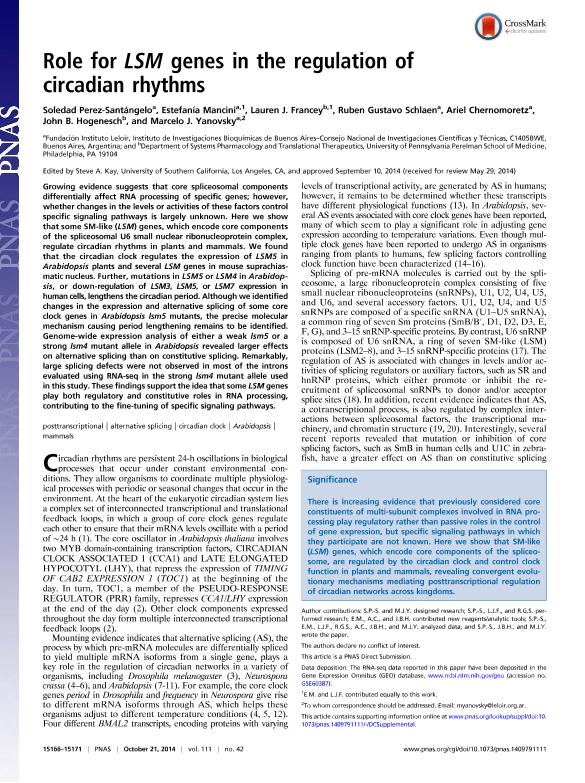Artículo
Role for LSM genes in the regulation of circadian rhythms
Perez Santangelo, Maria Soledad ; Mancini, Estefania
; Mancini, Estefania ; Francey, Lauren J.; Schlaen, Rubén Gustavo
; Francey, Lauren J.; Schlaen, Rubén Gustavo ; Chernomoretz, Ariel
; Chernomoretz, Ariel ; Hogenesch, John B.; Yanovsky, Marcelo Javier
; Hogenesch, John B.; Yanovsky, Marcelo Javier
 ; Mancini, Estefania
; Mancini, Estefania ; Francey, Lauren J.; Schlaen, Rubén Gustavo
; Francey, Lauren J.; Schlaen, Rubén Gustavo ; Chernomoretz, Ariel
; Chernomoretz, Ariel ; Hogenesch, John B.; Yanovsky, Marcelo Javier
; Hogenesch, John B.; Yanovsky, Marcelo Javier
Fecha de publicación:
10/2014
Editorial:
National Academy Of Sciences
Revista:
Proceedings Of The National Academy Of Sciences Of The United States Of America
ISSN:
0027-8424
Idioma:
Inglés
Tipo de recurso:
Artículo publicado
Clasificación temática:
Resumen
Growing evidence suggests that core spliceosomal components differentially affect RNA processing of specific genes; however, whether changes in the levels or activities of these factors control specific signaling pathways is largely unknown. Here we show that some SM-like (LSM) genes, which encode core components of the spliceosomal U6 small nuclear ribonucleoprotein complex, regulate circadian rhythms in plants and mammals. We found that the circadian clock regulates the expression of LSM5 in Arabidopsis plants and several LSM genes in mouse suprachiasmatic nucleus. Further, mutations in LSM5 or LSM4 in Arabidopsis, or down-regulation of LSM3, LSM5, or LSM7 expression in human cells, lengthens the circadian period. Although we identified changes in the expression and alternative splicing of some core clock genes in Arabidopsis lsm5 mutants, the precise molecular mechanism causing period lengthening remains to be identified. Genome-wide expression analysis of either a weak lsm5 or a strong lsm4 mutant allele in Arabidopsis revealed larger effects on alternative splicing than on constitutive splicing. Remarkably, large splicing defects were not observed in most of the introns evaluated using RNA-seq in the strong lsm4 mutant allele used in this study. These findings support the idea that some LSM genes play both regulatory and constitutive roles in RNA processing, contributing to the fine-tuning of specific signaling pathways.
Palabras clave:
Posttranscriptional
,
Alternative Splicing
,
Circadian Clock
,
Arabidopsis
,
Mammals
Archivos asociados
Licencia
Identificadores
Colecciones
Articulos(IIBBA)
Articulos de INST.DE INVEST.BIOQUIMICAS DE BS.AS(I)
Articulos de INST.DE INVEST.BIOQUIMICAS DE BS.AS(I)
Citación
Perez Santangelo, Maria Soledad; Mancini, Estefania; Francey, Lauren J.; Schlaen, Rubén Gustavo; Chernomoretz, Ariel; et al.; Role for LSM genes in the regulation of circadian rhythms; National Academy Of Sciences; Proceedings Of The National Academy Of Sciences Of The United States Of America; 111; 42; 10-2014; 15166-15171
Compartir



